At a Glance
Today’s guest, Dr. Os Guinness, is a deeply respected and prophetic author, teacher, and cultural critic. We are honored to have him join us again as a guest on the podcast. In this two-part interview, we glean Dr. Guinness’s wisdom on a variety of pressing cultural issues, ranging from “Christian nationalism” to “globalism” to transhumanism and the sexual revolution.
In part two, we also get his take on the recently released “Twitter files,” revealing widespread government and social media efforts to censor free speech. How should the church faithfully respond to these urgent issues? Os offers his wisdom on this as well.
What You'll Hear
Chapter 1: Introducing Os Guinness (1:07)
- Os Guinness is a famous writer from Englan.d
- He has written and edited over 30 books, including Zero Hour America: History’s Ultimatum Over Freedom and The Answer We Must Give.
- He was born in China during World War II to a pair of medical missionaries and graduated from Oxford with a doctorate in philosophy and social science.
Chapter 2: The Strawman of Christian Nationalism (6:10)
- The idea of Christian Nationalism dominating America is a strawman.
- Christian Patriotism is the idea that we can be Christian first and Americans second, while Christian Nationalism is putting America first and Christianity second.
- Christians should love their country, but freely call out any evil they see in their country, because they are Christians first.
- Christian Patriots aren’t dangerous, but they are unfairly maligned by those on the Far Left.
Chapter 3: Humanity in God’s Image (14:44)
- Humanity occupies a kind of “Middle Ground”, where we are below God but above animals and the rest of creation.
- According to Jewish thought, an element of sin is trying to “break out” of our position, either by going up and trying to become like God or going down and trying to become like animals.
- The current move of Transhumanism tries to push us up to be like God.
- We need to be careful not to let technology replace human relationships.
- Technology is wonderful, but we are entering uncharted territory, and while technology can be amazing, it can also have a cost.
Chapter 4: The Church in Politics (22:57)
- There is a divide in the American Church between those who think we should be very politically engaged and those that are more wary and advocate a non-partisan approach.
- Os traces the current divide back to the 1960s, where the view of the Church in politics was “privately engaged, publicly irrelevant.”
- This push to leave religious beliefs completely out of the public created a pushback in the Moral Majority, in which the Church flipped from not being active in politics to being overactive and playing politics in the same way as the secular world, rather than having a tempered, Christ-centered approach to politics.
- Even though there is disagreement in the Church in regards to politics, we should do our best to not let the divide become any stronger.
- Historically, the Church has split over political differences before, such as before the Civil War in the North and South over slavery.
- Os thinks that America’s deepest division is between two competing conceptions of freedom, one from the American Revolution which drew on Biblical ideas and one from the French Revolution, which leads to anti-religious thought and postmodernism.
- It is important to note that the view of freedom from the American Revolution is far from perfect, but it is far better than the postmodern view from the French Revolution.
- If we want to see a change, we need to promote a Christ-centered view of the world and of freedom.
- It is important to remember that the West is not the Church, and even if America ends up rejecting Christianity, many other areas in the world are embracing Christianity. God is still working!
Using the link above, you can read the transcript, listen along, and adjust the speed of the podcast while you listen.
The scandal of the church is that we're the most significant majority in the country, and yet culturally uninfluential, and that's a scandal before the Lord.
-Os Guinness
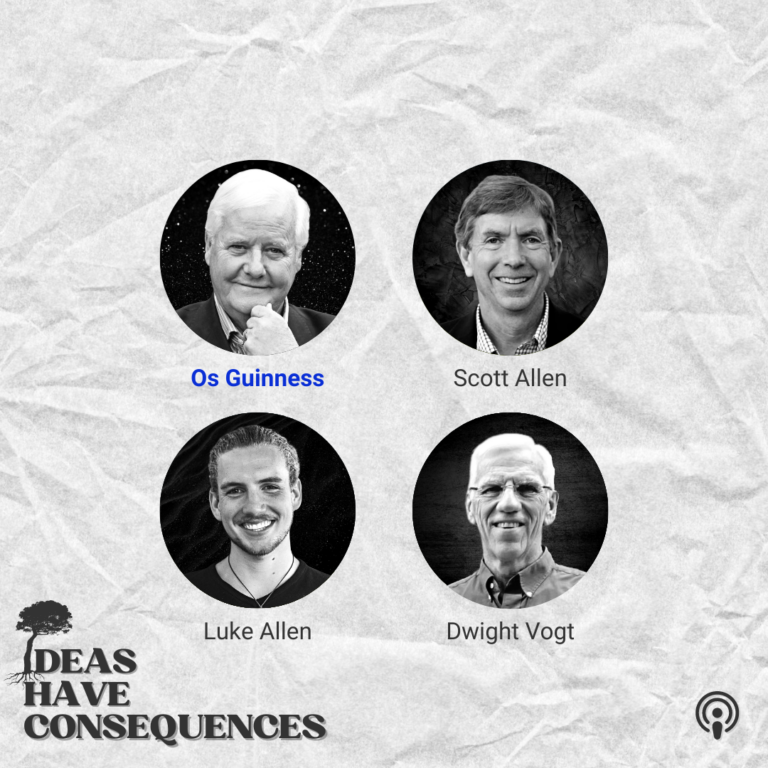
Go Deeper
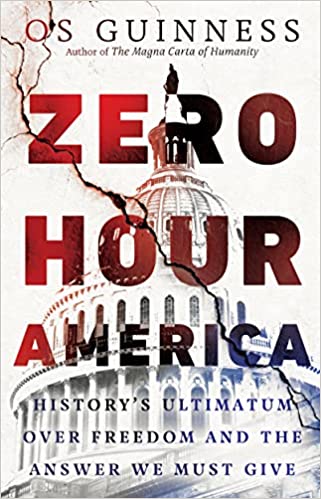
Zero Hour America: History’s Ultimatum over Freedom and the Answer We Must Give
Revolution? Oligarchy? Or homecoming? Americans are approaching a “zero hour” for the republic and its distinctive view of ordered freedom. America is caught between two revolutions and alternately suppresses and squanders freedom with a prodigal carelessness, with little understanding of the responsibilities that freedom requires.
Os Guinness warns that if America abandons its distinctive ideals and ideas, we will have carved into the chronicles of history yet another example of the failure of a free society. Like other crucial times in world history, the present crisis is a “civilizational moment” and also a pivot point that could lead to national renewal. Outlining seven key foundation stones of freedom, Guinness lays out a pathway for defining and ordering freedom, righting national wrongs, and passing freedom’s baton from generation to generation.
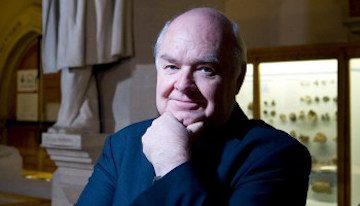
John Lennox: Transhumanism Versus Traditional Humans
In the second part of Oxford mathematician John Lennox’s bonus interview for the Science Uprising series, “John Lennox on the Transhumanist Claim AI Will Turn Humans into Gods” (October 17, 2022), Lennox talks about claims that we will merge with computers (artificial intelligence) to achieve immortality. How plausible is that?
In short: Very plausible, at least to a degree. And that should terrify us. The ideology of Transhumanism is one of the most dangerous threats to humanity today, and we should be very careful when we are forced to engage with these ideas as technology pushes the boundaries further and further.
Lennox is the author of 2084: Artificial Intelligence and the Future of Humanity (2020).
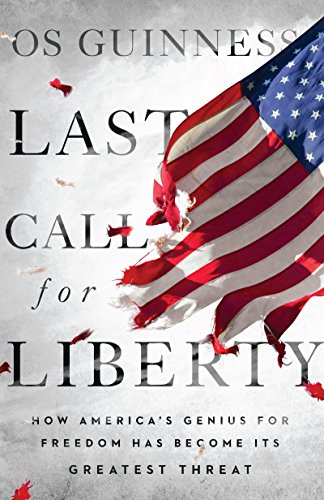
Last Call for Liberty: How America’s Genius for Freedom Has Become Its Greatest Threat
The hour is critical. The American republic is suffering its gravest crisis since the Civil War. Conflicts, hostility, and incivility now threaten to tear the country apart. Competing visions have led to a dangerous moment of cultural self-destruction. This is no longer politics as usual, but an era of political warfare where our enemies are not foreign adversaries, but our fellow citizens.
Yet the roots of the crisis are deeper than many realize. Os Guinness argues that we face a fundamental crisis of freedom, as America’s genius for freedom has become her Achilles’ heel. Our society’s conflicts are rooted in two rival views of freedom, one embodied in “1776” and the ideals of the American Revolution, and the other in “1789” and the ideals of the French Revolution. Once again America has become a house divided, and Americans must make up their minds as to which freedom to follow. Will the constitutional republic be restored or replaced?
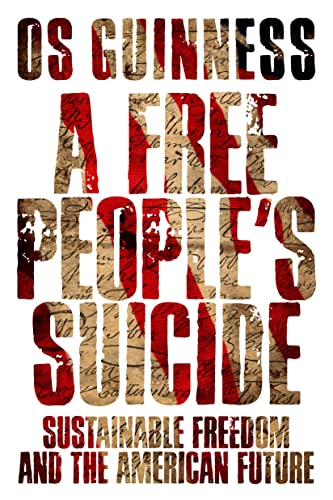
A Free People’s Suicide: Sustainable Freedom and the American Future
Nothing is more daring in the American experiment than the founders’ belief that the American republic could remain free forever. But how was this to be done, and are Americans doing it today?
It is not enough for freedom to be won. It must also be sustained.
Cultural observer Os Guinness argues that the American experiment in freedom is at risk. Summoning historical evidence on how democracies evolve, Guinness shows that contemporary views of freedom–most typically, a negative freedom from constraint– are unsustainable because they undermine the conditions necessary for freedom to thrive. He calls us to reconsider the audacity of sustainable freedom and what it would take to restore it.
“In the end,” Guinness writes, “the ultimate threat to the American republic will be Americans. The problem is not wolves at the door but termites in the floor.” The future of the republic depends on whether Americans will rise to the challenge of living up to America’s unfulfilled potential for freedom, both for itself and for the world.
Quotes
The core difference, (between) the emphasis on self-government, self-rule, local rule, and a globalist mindset has to do with the view of human beings, frankly, and the globalists almost view human beings like animals, and they’re in a position to know best how to care for all of the animals. -Scott Allen (14:49)
There’s a drive in sin, to break out of that middle level position in two ways. You break upwards through reason and technology. And the symbol in the Old Testament is the Egyptians with their demigods, and their defiance of mortality, and the pyramids, and so on… And in the modern world, that’s all a search for artificial intelligence we’ll be like gods… The other drive is to break downwards… If you break that category, and just merge with nature and the way the other animals are and define ourselves downwards, you have the religion of Canaan, or in Greek terms, Dionysian frenzy and worshiping. And in modern terms, things like the hookup culture. I think the Bible is incredibly profound in the way its view of humanity spells out either towards tyranny at the highest level or towards anarchy at the lowest level. -Os Guinness (16:13)
So Christians who don’t vote, Christians who think they’re just faithful and keep their heads down. That’s a failure of discipleship. They’re not following Christ’s lordship in the whole of life. And it’s a terrible failure of citizenship.. -Os Guinness (26:03)
The scandal of the church is that we’re the most significant majority in the country, and yet culturally uninfluential, and that’s a scandal before the Lord. -Os Guinness (26:25)
The deepest division is between those who understand America and freedom from the perspective of the American Revolution, which was largely, sadly, not fully, think of slavery, biblical, and those who understand American freedom from the perspective of ideas coming down from the French Revolution. So postmodernism, the sexual revolution, identity, going down the line, they are all the heirs of ideas coming from the French Revolution. Now you put that in biblical terms, the apostle Paul says, to the Galatians, “Who’s bewitched you? You started with the gospel of grace. And now you’re following another gospel.” And I’m saying, essentially to America, who’s bewitched you? You came to freedom through one revolution. And now you’re following another revolution. -Os Guinness (29:28)
Additional Resources
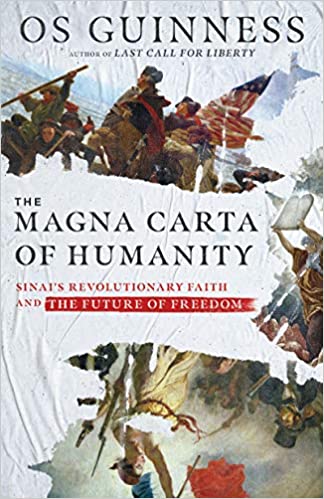
The Magna Carta of Humanity: Sinai’s Revolutionary Faith and the Future of Freedom
Cultural observer Os Guinness explores the nature of revolutionary faith, contrasting between secular revolutions such as the French Revolution and the faith-led revolution of ancient Israel. He argues that the story of Exodus is the highest, richest, and deepest vision for freedom in human history. It serves as the master story of human freedom and provides the greatest sustained critique of the abuse of power.
His contrast between “Paris” and “Sinai” offers a framework for discerning between two kinds of revolution and their different views of human nature, equality, and liberty. Drawing on the Hebrew and Christian Scriptures, Guinness develops Exodus as the Magna Carta of humanity, with a constructive vision of a morally responsible society of independent free people who are covenanted to each other and to justice, peace, stability, and the common good of the community. This is the model from the past that charts our path to the future.
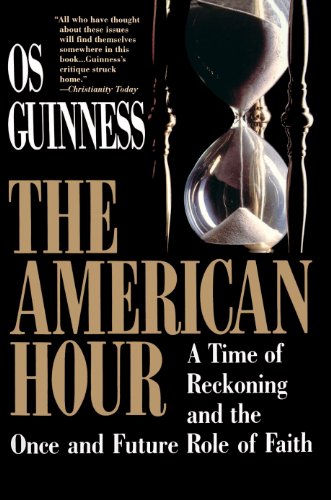
The American Hour: A Time of Reckoning and the Once and Future Role of Faith
An internationally known writer and speaker on religion and public life brilliantly analyzes the causes of our current moral malaise. Os Guinness examines how perilously close we have come to losing the shared beliefs, traditions, and ideals that have helped shape America and sets forth a compelling view of a new role for religion and faith.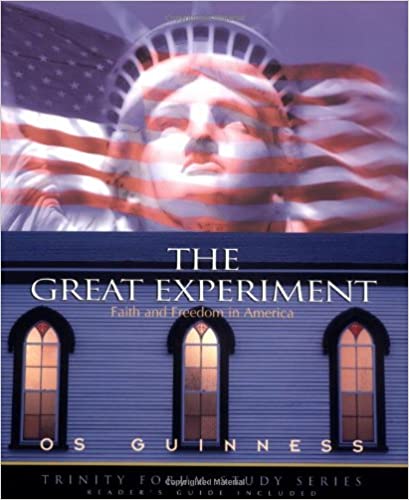
The Great Experiment: Faith and Freedom in America
George Washington called the American political ideal “The Great Experiment.” Contemporary English historian Paul Johnson writes, “The creation of the United States is the greatest of all human adventures.” The great American republican experiment is “a human achievement without parallel.” The early days of the Great Experiment bristled with questions. Can human beings establish good government simply through reflection and choice? Can a free people govern itself? Can a self-governing people sustain its freedom? What form of government best suits those who are neither angels nor animals, but imperfect human beings?
In The Great Experiment: Faith and Freedom in America, Os Guinness and The Trinity Forum lead readers through a series of readings that allow them to explore and reach conclusions about these vital issues. It will help Americans and all who love America seek to better understand the genius of the American experiment and the framers’ understanding of how it may be sustained. As The Trinity Forum examines the necessity of faith in a free society and the undeniable impact of faith on the American Experience, he looks at some of the major challenges facing the American republic at the beginning of the twenty-first century.
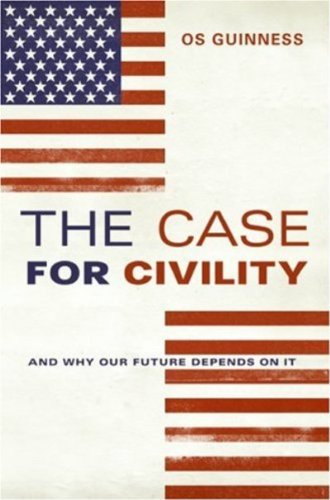
The Case for Civility And Why Our Future Depends on It
In a world torn apart by religious extremism on the one side and a strident secularism on the other, no question is more urgent than how we live with our deepest differences—especially our religious and ideological differences. The Case for Civility is a proposal for restoring civility in America as a way to foster civility around the world. Influential Christian writer and speaker Os Guinness makes a passionate plea to put an end to the polarization of American politics and culture that—rather than creating a public space for real debate—threatens to reverse the very principles our founders set into motion and that have long preserved liberty, diversity, and unity in this country.
Guinness takes on the contemporary threat of the excesses of the Religious Right and the secular Left, arguing that we must find a middle ground between privileging one religion over another and attempting to make all public expression of faith illegal. If we do not do this, Guinness contends, Western civilization as we know it will die. Always provocative and deeply insightful, Guinness puts forth a vision of a new, practical “civil and cosmopolitan public square” that speaks not only to America’s immediate concerns but to the long-term interests of the republic and the world.



